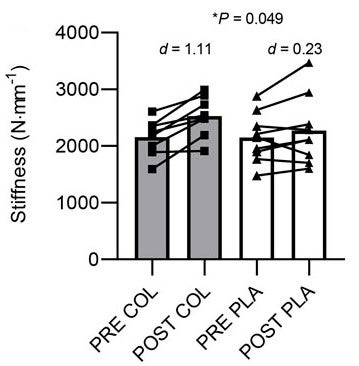
There’s New Evidence That Collagen Might Help Your Tendons – Outside
Outside’s long reads email newsletter features our strongest writing, most ambitious reporting, and award-winning storytelling about the outdoors. Sign up today.
“We can mold the muscles, you see,” says Bruce Denton, the wizened 1970s guru in John L. Parker Jr.’s Once a Runner. “We can strengthen the mind, temper the spirit, make the heart a goddamn turbine. But then a strand of gristle goes pop and presto you’re a pedestrian.” It was true then and it’s still true now: tendons and ligaments are the athlete’s Achilles heel, crucial to movement but vulnerable to overuse and (unlike muscles) mostly inert in response to attempts to strengthen them.
Back in 2019, I wrote about a new-ish idea that was circulating among elite athletes and their trainers, the brainchild of UC Davis molecular biologist Keith Baar. Tendons and ligaments are mostly made of up collagen. Lab experiments with engineered ligaments suggested that the availability of certain key components of collagen, like the amino acid proline, could ramp up the repair and synthesis of new collagen in connective tissue. Collagen supplements have been around for a long time, but Baar had specific ideas about the type of exercise that tendons and ligaments respond to and the form of collagen that would be best to supplement with. He used gelatin, the same stuff found in Jell-O.
The initial work from Baar and his collaborators was intriguing but far from definitive. Then the pandemic hit. The pace of follow-up research has been slow, but a few results have begun to appear—including a newly published study in the journal Frontiers in Physiology from a group at Liverpool John Moores University led by Robert Erskine. In elite female soccer players, they find a big improvement in tendon stiffness—which is a good thing—after taking collagen supplements three times a week.
The study involved 17 players from the under-21 squad of a Football Association Women’s Super League team. Half of them were assigned to take 30 grams of hydrolyzed collagen (they used GBR Nutrition’s Collagen Liquid) three times a week immediately after training. The control group took a calorie-matched placebo drink. Each group also took 500 milligrams of vitamin C, which is thought to be necessary for the body to use the collagen.
The training was a mix of on-field soccer practice, leg strengthening exercises, and plyometrics, as per usual, rather than following a special exercise program. The properties of the patellar tendon, which connects the kneecap to the shin bone and is a common site of injury for female soccer players, were measured before and after with ultrasound and strength tests.
The result was an increase in tendon stiffness. You can think of tendons as elastic bands: the stiffer they are, the harder they are stretch, and the more energy they can store. Stiffer tendons, for example, are associated with better running economy, because they recycle more energy from stride to stride. Here’s the stiffness data, showing how much force it takes to stretch the tendons. In the collagen group, stiffness makes a big jump from before (PRE COL) to after (POST COL) training. In the placebo group, the change in the before (PRE PLA) and after (POST PLA) values is much smaller:

The collagen group’s 18-percent gain in stiffness is significantly bigger than the placebo group’s 8-percent gain. In contrast, there were no differences in the size or cross-sectional area of the tendon, which suggests that the extra collagen improved the microscopic structure of the tendon. There were also no differences in leg strength.
Other recent studies have also bolstered the case for collagen supplementation—but each in slightly different ways, strangely. Last year, Dana Lis and her colleagues in Keith Baar’s UC Davis group published results suggesting that pre-workout collagen plus vitamin C enhances squat and jump performance, but without a significant change in leg stiffness. Also in 2022, Simon Jerger of the University of Freiburg and his team found that daily collagen supplements did boost tendon cross-sectional area, but didn’t improve tendon stiffness more than the placebo group.
All this is a little confusing, and Erskine and his colleagues spend some time in their paper coming up with possible explanations for why each study seems to produce different results. The study protocols were different, so it’s not totally crazy that the results differ. In fact, the positive results from different dosing and exercise protocols are in some sense encouraging, since it implies that you don’t need to follow one specific magical protocol to get the benefits.
But the lack of uniformity should also give us pause. If there’s one thing we know about supplement research, it’s that if you measure enough outcomes, every study finds improvement in at least one. The collagen research, from what I can see, is built on the foundations of good theoretical and basic lab work—but I don’t think its real-world benefits are proven yet.
Still, it’s worth recalling the prevailing orthodoxy, which is that tendons and ligaments are pretty much inert under normal conditions. That’s one of the reasons they heal so slowly—if ever—when you injure them. So anything that can help strengthen them or improve their properties is a big deal, both for prevention and rehab. It’s clear that the details still need to be worked out, but if studies like this one keep accumulating, it will be good news for all of us.
For more Sweat Science, join me on Twitter and Facebook, sign up for the email newsletter, and check out my book Endure: Mind, Body, and the Curiously Elastic Limits of Human Performance.